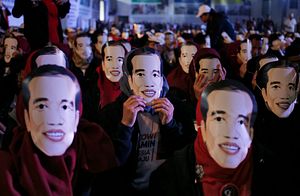On April 17, 2019, Indonesians will head to the polls to partake in another much-anticipated general election. It will be the country’s fifth consecutive election since undergoing a transition to democracy in 1998 that was seen by many as a significant development not just for Indonesia itself, but for Southeast Asia and the wider Muslim world more generally.
At first glance, this year’s presidential election might appear to be just a rematch between the two candidates who faced off against each other in 2014: incumbent President Joko “Jokowi” Widodo and his challenger Prabowo Subianto. As many analysts have suggested, a number of developments that occurred during Jokowi’s first term will play out in the polls. The arrest and jailing of the former governor of Jakarta, Basuki Tjahaja Purnama (commonly known as Ahok), on blasphemy charges in 2017 is one such high-profile development that many see as affecting the upcoming election. Over the course of Ahok saga, Prabowo embraced Islamists and in turn Jokowi reacted by rolling back protections for civil liberties in order to suppress Prabowo’s supporters.
In reality, rising anxieties about religious conservatism and intolerance in Indonesia are only one aspect of a broader range of concerns about the state of the country’s democracy. The bigger picture as Indonesia goes to the polls is the fact that years of democratic retrenchment have fueled populist anger, which has manifested in the form of growing discontent against the establishment and the elites; rising Islamic conservatism and intolerance; and economic nationalism. These trends have raised concerns about how various political, economic, and sociocultural variables could play out in the upcoming polls. And, unlike five years ago when there was much optimism regarding Indonesia’s future, these trends have driven a high level of pessimism about the course the country will take following the election, irrespective of who actually wins. Some are worried that Indonesia’s democracy could be on a path of deconsolidation and even collapse.
Since undergoing a democratic transition in 1998, Indonesia has often been considered one of the most successful democracies in Southeast Asia, and one of only a few Muslim-majority nations to have successfully democratized. Milestones include conducting four consecutive elections (about every five years) that have been widely recognized by international observers to be free and fair; sweeping constitutional reforms completed in 2004, which redistributed power equally among the executive, legislative, and judiciary branches of government; and the establishment of new institutions such as the Constitutional Court (MK) and the Corruption Eradication Commission (KPK) that are supposed to hold public officials and civil servants more accountable.
However, these accomplishments are gradually eroding. Observers warned about Indonesia’s democratic retrenchment as early as 2010. This democratic erosion has been driven by members of the country’s political and economic elite, many of whom started to accumulate power during Suharto’s New Order and then become even more politically influential and economically powerful during the Reformasi era. Gradually, they have managed to roll back democratic reforms and push new laws and regulations that curtail freedom of speech, expression, and organization within the country.

































